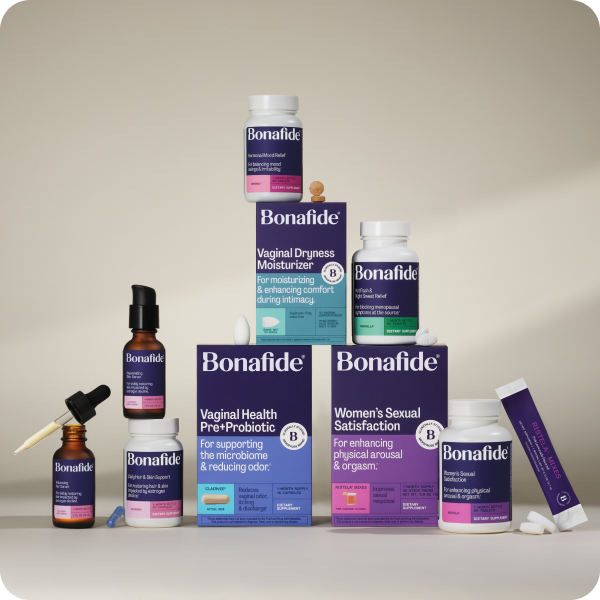Half of the earth’s population will experience menopause—and the wide array of symptoms that typically accompany it—as a part of growing older. Because menopause can be a challenging time, many women find themselves researching and trying different solutions to ease their transition. Many women may wonder – are dietary supplements safe?
Some effective, clinically studied options for menopause symptom relief come from dietary supplements, but these products are often viewed with a cautious eye because they aren’t officially “approved” by the Food and Drug Administration (FDA). However, that doesn’t mean they’re unsafe or ineffective.
Understanding the role the FDA plays in overseeing and regulating dietary supplements may help answer some of your questions and ease concerns about whether dietary supplements are safe for women in perimenopause and menopause.
What are Vitamins and Supplements?
Although the two words are often used interchangeably, vitamins and supplements are not the same thing—or rather, vitamins are one of many types of dietary supplements.
A vitamin is a nutrient the body needs in small amounts to function properly and stay healthy. Vitamins can be divided into two categories: fat-soluble and water-soluble:1
- Fat-soluble vitamins can dissolve in fats or oils. Excess amounts of these vitamins are stored in the body’s fatty tissues. Examples are vitamins A, D, E and K.
- Water-soluble vitamins can dissolve in water. Excess amounts of these vitamins are removed from the body in urine. Examples are vitamin C and the eight B vitamins.
In addition to vitamins, the umbrella term “supplement” can also cover minerals, amino acids, enzymes, and botanicals such as herbs.
Are Vitamins and Supplements Approved by the FDA?
You may be wondering, why aren’t vitamins FDA approved? Because dietary supplements are not legally defined as drugs or food, the FDA doesn’t “approve” dietary supplements or their labeling. But they do play a role in regulating them, performing tasks such as:2
- Inspecting dietary supplement manufacturing establishments
- Monitoring the dietary supplement marketplace
- Examining dietary supplements and ingredients offered for import to determine whether they meet U.S. requirements
- Reviewing adverse event reports to identify any products that may be unsafe
Additional Regulation of Supplements
In addition to being regulated (but not approved) by the FDA, dietary supplements are also regulated by the Dietary Supplement Health and Education Act of 1994 (DSHEA).3,4 This statute of federal legislation was designed to establish standards for dietary supplements, making them safer by disallowing manufacturers and distributors from producing mislabeled or adulterated products.
This means that supplement companies, such as Bonafide®, are responsible for evaluating the efficacy, safety, and labeling of their products before producing any messaging or marketing to ensure that they meet all the requirements of the Federal Food, Drug, and Cosmetic Act as amended by DSHEA and FDA regulations. It also means the FDA has the authority to take action against any adulterated or misbranded dietary supplement product after it reaches the market.
Are Bonafide Supplements Safe?
“Bonafide is dedicated to only providing high quality women’s health products to its customers,” says Bonafide’s Sr. Director of Quality Assurance, Salma Fathalla. “To stay on top of the latest manufacturing and quality requirements, we monitor regulatory agency websites for guidance and FDA warning letters; we also subscribe to industry newsletters, are members of industry associations and attend conferences throughout the year.”
When it comes to ensuring the quality of its products, Bonafide is active throughout the entire process. “We start with a rigorous qualification of our raw material suppliers and manufacturing partners to make sure we are following 21 CFR 111 and 21 CFR 117,” Fathalla explains, referring to the reviews and approvals of controls that are put in place to ensure automated, mechanical or electronic equipment is functioning in accordance with its intended use.
“Each phase of our products’ manufacturing process must adhere to the cGMPs (Current Good Manufacturing Practice regulations enforced by the FDA), which is confirmed by a desk audit and an on-site audit,” Fathalla added. “Prior to the launch of a new product, specifications are created explicitly to that product’s formulation, in order to ensure the product is both safe and effective. Extensive testing is conducted on the finished product as well, to ensure it’s safe, potent, and free of any contaminants or adulterants. Further, we conduct thorough stability studies on our products to ensure our customers will have safe, effective products until the printed expiration date.”
Dietary Supplements: What to Look For
Given the confusion surrounding the dietary supplement industry, it’s understandable that people are unsure about how to know which products are safe and effective. To ensure you’re getting a high-quality supplement, look for companies that strictly adhere to FDA and DSHEA guidelines regarding the product’s ingredients—both active and inactive— that they feature on the labels of their products. Also be careful to choose products that have been scientifically tested and thoroughly researched whenever possible.
It’s always a good idea to check in with your healthcare provider before starting a new supplement as well, particularly if you take prescription or over-the-counter medications. Your provider can check for potential drug interactions or other concerns, helping you determine if a particular supplement is right for you.
Resources
- https://www.cancer.gov/publications/dictionaries/cancer-terms/def/vitamin
- https://www.fda.gov/food/information-consumers-using-dietary-supplements/questions-and-answers-dietary-supplements#:~:text=However%2C%20by%20law%2C%20FDA%20does,(e.g.%2C%20health%20claims)
- https://www.fda.gov/food/current-good-manufacturing-practices-cgmps-food-and-dietary-supplements/current-good-manufacturing-practices-cgmps-dietary-supplement
- https://ods.od.nih.gov/About/DSHEA_Wording.aspx








